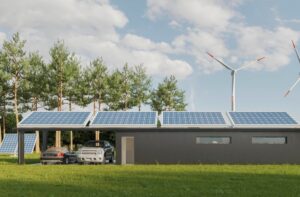Unlocking the Full Picture of Home Solar System Costs with O’Donnell Solar
Do you want to know how much home solar systems cost? At O’Donnell Solar, we understand that one of the first questions on your mind is likely, “How much do home solar systems cost?” In recent years, the adoption of solar energy has skyrocketed as homeowners search for sustainable ways to power their homes while reducing their environmental impact. Solar panels not only provide an eco-friendly energy solution but also deliver substantial long-term savings on electricity bills. However, before embarking on your journey into residential solar systems, it’s crucial to gain a comprehensive understanding of the various factors that contribute to their cost. In this informative guide, we will delve into the intricacies of home solar system pricing, empowering you to make an informed decision.
1. The Initial Investment
Let’s commence with the most apparent cost associated with home solar systems: the initial installation cost. The price of a solar panel system can vary significantly, depending on several factors. These include the size of your system, your geographical location, the quality of equipment used, and any additional features or customization you choose.
System Size: The size of your solar system, typically measured in kilowatts (kW) or watts (W), plays a pivotal role in determining the cost. Larger systems require a larger investment but generate more electricity.
Location: Your geographical location is a key cost factor. Different regions receive varying amounts of sunlight throughout the year, impacting the number of panels required to generate your desired electricity. Additionally, local regulations and incentives can influence overall costs.
Equipment Quality: The quality of solar panels, inverters, and other components can affect the overall system cost. While high-quality equipment may come with a higher upfront price, it often delivers better performance and durability, resulting in long-term savings.
Customization: If you opt for additional features or customization, such as battery storage or solar tracking systems, expect to invest more. These features can enhance system efficiency and energy independence but come at an additional cost.
2. Government Incentives and Rebates
The cost of installing a home solar system can be substantially offset by government incentives, tax credits, and rebates. These programs are designed to encourage homeowners to transition to renewable energy sources and decrease their carbon footprint.
Federal Tax Credits: The Federal Investment Tax Credit (ITC) allows homeowners to deduct a portion of their solar installation costs from their federal taxes. As of my last knowledge update in September 2021, this credit covered up to 26% of the installation cost. Please check for the most up-to-date information, as these percentages can change over time.
State and Local Incentives: Many states and local governments offer additional incentives, such as cash rebates or property tax exemptions, to promote solar adoption. These incentives can vary widely by location.
Solar Renewable Energy Certificates (SRECs): Some states operate SREC programs where homeowners earn credits for the electricity their solar panels generate. These credits can then be sold to utilities or other entities, providing an additional source of income.
3. Long-Term Savings
While the initial cost of a home solar system may appear significant, it’s crucial to consider the substantial long-term financial benefits. Solar panels typically have a lifespan of 25 years or more, and during this time, they can significantly reduce or even eliminate your electricity bills.
Energy Savings: By generating your electricity, you’ll rely less on power from the grid, leading to lower monthly energy bills. In some cases, homeowners with solar panels experience a remarkable reduction in their electricity expenses or even generate surplus energy that can be sold back to the grid.
Return on Investment (ROI): Over time, the savings on your electricity bills can offset the initial installation cost. In many cases, homeowners achieve a positive ROI within a few years, making solar panels a wise financial investment.
Increased Property Value: Solar panels can also increase the resale value of your home. Prospective buyers often view solar panels as a valuable addition, and studies have shown that homes with solar installations tend to sell for higher prices.
4. Financing Options
To make solar installations more accessible, various financing options are available:
Cash Purchase: Paying for your solar system upfront offers the most significant long-term savings, as you avoid financing costs and interest. However, it requires a substantial initial investment.
Solar Loans: Many financial institutions offer home solar loans with competitive interest rates. These loans allow homeowners to finance their solar installations over a set period, with the option to pay off the loan early to reduce interest costs.
Solar Leases/Power Purchase Agreements (PPAs): With a solar lease or PPA, you don’t own the solar panels, but you pay a fixed monthly fee for the electricity they generate. While this option may require little to no upfront cost, it typically offers lower long-term savings compared to purchasing a system.
5. Maintenance and Operating Costs
One of the advantages of solar panels is their relatively low maintenance requirements. Routine maintenance typically includes cleaning the panels and ensuring the system operates correctly. The cost of maintenance is minimal compared to the savings on your energy bills. Additionally, most solar panel manufacturers offer warranties that cover maintenance and repairs for a specified period.
6. Conclusion
The cost of a home solar system can vary widely based on several factors, including system size, location, equipment quality, and customization options. However, it’s crucial to view solar installations as a long-term investment that provides substantial savings on electricity bills, potential incentives and tax credits, and increased property value.
Before making a decision, it’s advisable to obtain multiple quotes from reputable solar installers, consider available financing options, and research local incentives. Over time, the financial and environmental benefits of solar energy can make your initial investment well worth it, allowing you to enjoy clean, renewable energy while reducing your carbon footprint and energy costs.
At O’Donnell Solar, we are committed to helping you navigate this journey and make the most informed decision for your home’s solar needs. Contact us today to learn more about how you can embark on your path to clean and sustainable energy.



